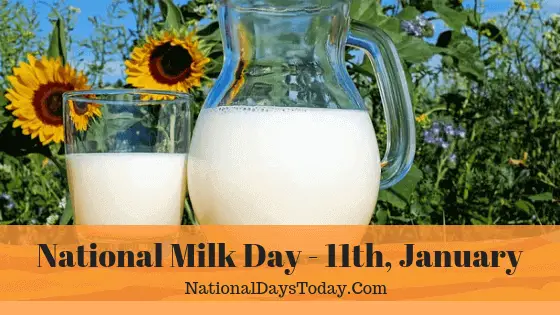National Milk Day
National Milk Day:
Celebrated on January 11th, every year.The day is to recognize the health benefits of Milk.It is also celebrated on November 26, in some parts of the country. Hence, the exact date of celebration is not settled.
| Year | Date | Day | Where |
| 2020 | 11th January | Saturday | United States |
| 2021 | 11th January | Monday | United States |
| 2022 | 11th January | Tuesday | United States |
Twitter Hashtags:
#MilkDay
#NationalMilkDay
Related: Other National Days Celebrated on January 11th:
National Human Trafficking Awareness Day
National Step In The Puddle And Splash Your Friends Day
Why Milk Day?
Today is the Milk Day. Do you know that Milk is a power packed drink with nine nutrients (protein, Calcium, Potassium, Phosphorus, Vitamin D, Vitamin B12, Vitamin A, Riboflavin and Niacin) that are essential for health. The presence of calcium makes our bones and teeth stronger. Riboflavin helps in converting food into energy. Protein present in the milk builds muscle tissues. Potassium regulates blood pressure. Phosphorous stimulates energy. Vitamin B12 is responsible for regulating the red blood corpuscles. Vitamin A improvise vision, makes our skin healthy and play a pivotal role in maintaining the immune system in force.
How we can Celebrate National Milk Day:
use #NationalMilkDay to post on the social media. Post about the uses, unknown uses, recipes, health benefits and so on.
Interesting Facts About National Milk Day:
A method of killing harmful bacteria in milk is called as pasteurization.
The first bottled milk was patented by Hervey Thatcher, an American doctor in the year 1884.He named it as “Thatcher’s Common Sense Milk Jar”.
A study estimated by Food and Agriculture organization reveals that around 85 percent of the milk is Cow’s milk.
Producers of Milk:
The largest producers of Cow’s Milk and other milk centric dairy products are United States and India. The other prominent producers are china, Germany, Brazil, Russia, New Zealand, France, United Kingdom and Turkey.
Uses of Milk:
Generally, Milk is used to produce cream, cheese, butter, Ghee, Ice cream, condensed milk, toned milk, milk powder, coffee, Tea, Cosmetics, chocolates, beverages etc. There are around 6 billion people consuming milk on a daily basis in one form or other.
Few Unknown uses of Milk in various countries:
A term called “Abhisheka” is famous among Indians. Despite of different terms used to denote in various Indian languages, this term “Abhisheka” is a commonly used one. This is actually a part of ritual where milk is offered to god by pouring it on the deity’s statue. Other milk products like includes Ghee, Yogurt and butter is widely used as well. After this process, the offered milk is collected and given as “prasaadham” or “theertham” to the worshippers for consumption.
Milk is also used as fungicide by gardeners; however, its effectiveness remains a question.
Health benefits of Milk:
A recent study says that Milk helps in reducing Weight. Consuming a glass of milk daily prevents Osteoporosis. However, it is not proved in kids cases.
It prevents Blood pressure and Cardio vascular diseases due to the enormous amount of potassium present in the Milk. Moreover, it avoids stroke and reduces gall stone formation chances.
Consumption of milk deprives cancer, a study researched by National Cancer Institute reveals. The presence of Vitamin D in Milk helps to fortify depression.
As of now, there is no cure for knee osteoarthritis, a bone disorder. However, doctors suggests that having a glass of milk on a daily basis could prevent the progression of the disease.
Choline in Milk supports learning ability, memory and Sleep. Moreover, it helps in regulating the shape of the membranes of cells. It reduces chronic inflammation.
Also, Note:
Milk Allergy: Otherwise called as lactose intolerance, it is due to the fact that some of us do not produce enough lactase, an enzyme used to digest the sugar in Milk. In that case, it is not recommended to drink milk; instead, you can substitute it with some other like soy milk.
2). A cup of milk is composed of 13 grams of carbohydrates, 8 grams of fat and protein respectively. Perhaps, a cup of soy milk contains 3 grams of fat, 6 grams of carbohydrates and 6 grams of protein. Therefore, Soy milk is the one of best substitutes that could cope up with the nutrients of Cow’ s Milk.
Not only Lactose intolerance, milk allergy is also associated with Hypersensitivity, consumption of milk might also leads to the production of an antibody called immunoglobin that could lead to some serious disorders like Asthma, diarrhea, wheezing, bleeding, pneumonia, and anaphylaxis. Other normal symptoms could be vomiting, inflammation and rashes.
The American Academy of Pediatrics strongly discourages milk for babies below 1 year since the iron content in milk is low when compared with mother’s breast milk. At this scenario, Consumption of milk could lead to gastrointestinal bleeding in babies.
History of National Milk Day:
Representatives of International Association of Milk approached Congress during the year 1915 for crediting an entire day as national Milk Day. Rather, the request was never considered by the congress. Thus, the creator or the history is not known. As of now, The National Milk Day is celebrated on either November 26 or January 11.


